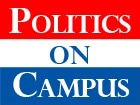By Judy Estey
Unigo Campus Rep at Barnard College
Oct. 28, 2008
When Barack Obama and John McCain visited Columbia’s campus on Sept. 11 this year, hundreds of students camped out on the main library steps watching a huge screen with the simulcast of the politicians’ interviews. Sitting outside with this mass of students, it was easy to ascertain popular opinion — groans, boos, and laughter when McCain spoke, wild applause when Obama did. But there was one issue that provoked an uncomfortable silence when addressed by Senator Obama: the issue of the ROTC recruiter’s non-presence on Columbia’s campus. As Obama said, the “notion that young people here at Columbia aren’t offered a choice or an option in participating in military service is a mistake.”
This is a mistake that most Columbia students would like to continue.
The University’s policy against ROTC recruiters stems from the military’s “don’t ask, don’t tell policy.” As Columbia University President Lee Bollinger wrote in an e-mail sent to the student body, “Under the current policy of the Defense Department, openly gay and lesbian students could or would be excluded from participating in ROTC activities. That is inconsistent with the fundamental values of the University.”
Most students at Barnard College agree with President Bollinger’s reasoning.
“I support their non-presence because I agree with university policy that any group that discriminates against Barnard students does not belong on campus,” said Rachel Farber, a sophomore.
The significance of this issue specifically at Barnard might be attributed to the expectation that, as a women’s college, Barnard has a disproportionately large gay population. Actually, most BC students would not consider the gay student body any more numerous than that of other liberal arts colleges in the Northeast. Is it telling that on Oct. 10, more students attended a meeting on the economy than the National Coming Out Day party held at the same time?
“I would say it’s very much a non-issue…Here, there’s not really pressure to define yourself as having any certain sexuality,” reported Sarracina Littlebird, an environmental biology major.
“I don’t think it’s way more present than at any other schools. I don’t think there’s a large gay presence here,” concurred Farber.
However, gay rights are an important issue for Barnard students — gay and straight alike. October is Queer Awareness Month, and organizations such as Q (Barnard’s Queer Student Organization), Columbia Queer Alliance, and Office of Multicultural Affairs have made themselves very visible, including co-sponsoring several of Columbia Political Union’s debate watch parties. Other events have included a trans-underwear party (called Gender-F*ck), a talk by women’s studies professor Rebecca Young about the “gay gene”, Queer Prom, and National Coming Out Day, among others.
“I think it has more to do with [Barnard as a] women’s college that advocates policies that are more women-friendly, that inevitably includes more acceptance of a gay culture… It’s actually a little bit cool to be gay on Barnard’s campus because it’s one of those pro-sexual, positive, pro-female expression and empowerment that often coincides with feminism, which is obviously very huge on Barnard’s campus,” explained Chauntez Wilson, a junior political science and physics major.
What’s interesting about the ROTC issue and gay rights issue on campus is that they, for the most part, are not in line with the policies of either of the two top candidates. Neither candidate supports gay marriage, an issue that students on the Barnard and Columbia campus find very important. “I have to say I’m a little disappointed that neither candidate is for gay marriage. I understand it’s a tough issue and the fact that Joe Biden is Catholic and McCain and Palin are very conservative, but I personally do believe in gay marriage and I just voted “no” on Proposition 8 in California [a ban on gay marriage],” said Gillian Drake, a junior physics major.
The Columbia Political Union, which has been hosting debates between the College Democrats and College Republicans (each party debating the candidates’ positions, not their organizations’), held a debate specifically on “Queer Issues and the Presidential Election” on Oct. 15. Gay rights, an issue that received one question in the third presidential debate, received its own night at Columbia. This really showcases the political reality at Columbia University and Barnard College — we may be like everyone else in voting for Barack Obama, but we’re still more liberal than you!
